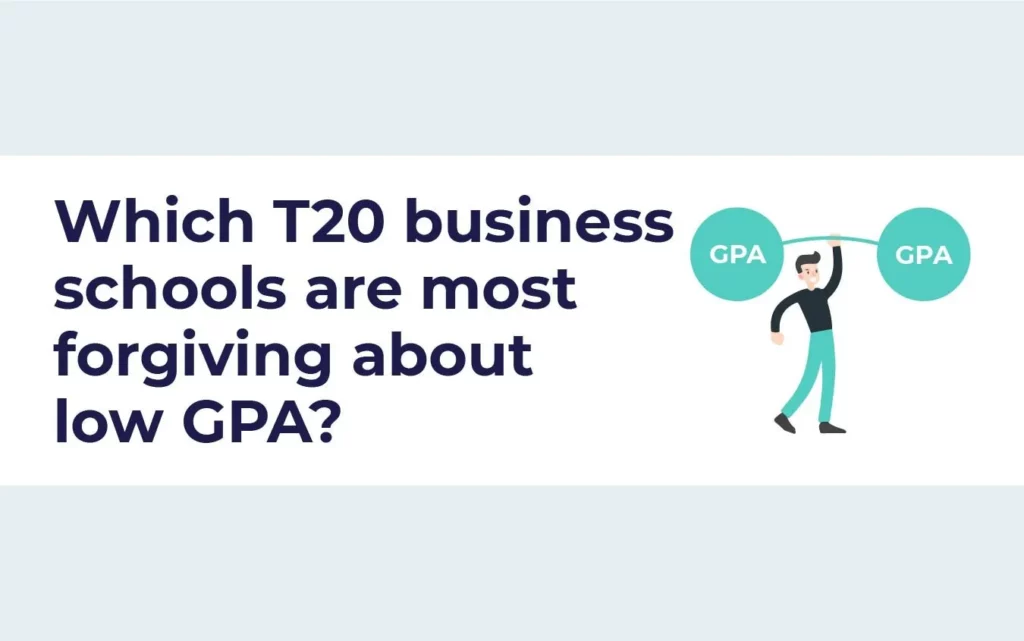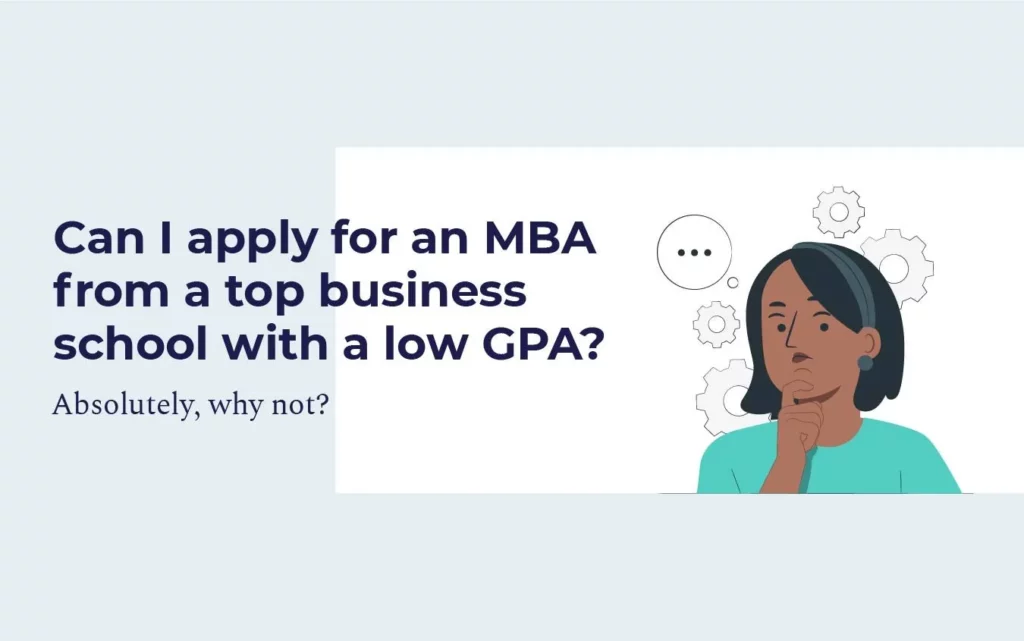Which T20 Business Schools are Most Forgiving About Low GPA

For students aiming to join top 20 (T20) business schools, GPA is typically a crucial component of the admissions profile. However, if your undergraduate GPA is lower than the average range, there’s good news: several T20 MBA programs have holistic admissions processes and are willing to overlook a lower GPA if applicants demonstrate exceptional strengths in other areas. This post provides insights into which T20 business schools are more flexible with low GPAs and how applicants can strengthen their applications to increase their chances.
Why Some T20 Business Schools Are Flexible About GPA

Top-tier MBA programs are increasingly valuing diverse experiences and professional backgrounds, understanding that GPA alone may not fully represent an applicant’s potential. Many T20 schools, including those in the M7 (e.g., MIT Sloan and Chicago Booth), are known to emphasize a well-rounded profile and look beyond academic transcripts. These schools evaluate applicants holistically, weighing factors such as leadership experience, GMAT/GRE scores, and the rigor of past work or academic experiences, allowing for a low GPA to be mitigated by other strengths.
For example, at Stanford GSB and Harvard, strong professional accomplishments or high GMAT scores can offset a GPA that’s below their typical 3.6 to 3.8 range. Other schools like Columbia Business School and NYU Stern, known for their flexible admissions policies, will consider applicants with a GPA below 3.5 if they demonstrate strong quantitative skills or come from challenging academic backgrounds. Schools like Emory’s Goizueta and Duke’s Fuqua also view applications comprehensively, often balancing GPA with other factors, such as career progression and community impact, making them options to consider for applicants concerned about a lower GPA.
These admissions policies reflect the growing understanding within business schools that GPA may not always represent the full scope of a candidate’s potential, especially if there is evidence of growth or excellence in other areas of their application.
Top T20 Business Schools Known for Forgiving Low GPAs
Several T20 business schools adopt a holistic review process, which means that applicants with lower-than-average GPAs can still be admitted if they demonstrate strength in other areas of their application. Here are some top T20 business schools known for being relatively forgiving about GPA:
- Harvard Business School (HBS): While Harvard typically admits candidates with GPAs averaging around 3.7 to 3.8, they consider applications with lower GPAs if applicants have strong GMAT scores, relevant work experience, or exceptional leadership qualities. HBS emphasizes well-rounded applicants and looks closely at post-college accomplishments.
- Columbia Business School (CBS): CBS accepts students with GPAs that fall within a range (middle 80% range is 3.2–3.9), allowing flexibility for applicants with unique professional backgrounds or high GMAT scores. Columbia looks at other factors like professional achievements, leadership experience, and well-defined career goals.
- UCLA Anderson School of Management: UCLA Anderson is another T20 school that values professional experience, leadership potential, and compelling recommendations. The school allows applicants with lower GPAs to offset this with a strong GMAT or GRE score, or by demonstrating post-college achievements, such as high performance in relevant work roles.
- Duke’s Fuqua School of Business: Known for its collaborative culture, Duke’s admissions committee weighs qualities like teamwork and community involvement alongside academic performance. Applicants with a lower GPA may still be competitive if they present strong leadership experience or excel in other aspects of their application.
These schools demonstrate that while GPA is important, it does not solely define your candidacy; they are open to applicants who can showcase their skills, growth, and readiness for an MBA program through other strengths.
Compensating for a Low GPA in Your Application
If you’re applying to a T20 business school with a lower GPA, consider these strategies to strengthen your profile:
- High GMAT/GRE Scores: Many admissions teams see strong test scores as a counterbalance to a lower GPA, showing that you have the quantitative and analytical abilities needed for MBA coursework. For instance, a GMAT score above 700 can help boost applications where the GPA is lower than average for T20 schools.
- Significant Professional Achievements: Highlight promotions, leadership roles, and impactful projects in your work experience. Business schools, especially those in the M7, value candidates who bring substantial work experience and tangible accomplishments, as this demonstrates readiness for post-MBA roles.
- Compelling Essays and Recommendations: Use application essays to explain any relevant context for your GPA, such as challenging circumstances or a demanding major. Recommendations from current or former supervisors can also provide valuable third-party insight into your skills and potential, helping to offset a lower academic record.
These approaches can help you build a robust application that emphasizes your strengths, increases your competitiveness, and demonstrates that you are prepared to succeed in a top MBA program.
Want to pursue an MBA but not sure if your profile fits?
Talk to our Profile Experts to know your chances for a top MBA Program.
GET A FREE PROFILE ANALYSISFinancial Considerations and Scholarships for Low GPA Applicants
For applicants with a lower GPA, securing financial support such as scholarships or need-based aid can be instrumental in making a T20 MBA more accessible. Here’s how some top business schools approach financial aid, specifically catering to diverse applicant needs:
- Harvard Business School (HBS): Known for generous financial aid, HBS provides need-based scholarships that cover up to full tuition, with average awards of around $46,000 annually (about $92,000 over two years). HBS aims to keep its program financially accessible and doesn’t penalize applicants for a lower GPA as long as other elements like work experience or leadership achievements stand out. This can be particularly beneficial for students looking to finance their studies despite a less-than-perfect academic record.
- Columbia Business School (CBS): Columbia offers both need- and merit-based scholarships to attract high-potential candidates from varied backgrounds, including those who may need to offset lower GPAs with other application strengths. Additionally, Columbia provides substantial access to loan programs for international students, which can be crucial for applicants with financial constraints. Merit scholarships are competitive, with awards up to full tuition for standout applicants.
- University of Chicago Booth: Booth also offers need-based assistance and merit-based fellowships to support talented candidates. Given Booth’s holistic admissions approach, strong professional experience, high GMAT scores, or significant accomplishments can help balance out a lower GPA, making merit scholarships an option for diverse applicants.
These financial resources from top schools indicate that while GPA is a consideration, applicants who excel in other areas and clearly articulate their goals can access substantial support.
Additional Tips for Applicants with Low GPAs
If you’re concerned about your GPA, there are additional strategies to enhance your MBA application and improve your chances at a T20 business schools:
- Supplement with Coursework: Enrolling in relevant courses, particularly in quantitative fields, can demonstrate academic improvement. For example, retaking courses like statistics or accounting through a community college or online platform can showcase your commitment and boost your academic profile.
- Strong Letters of Recommendation: Choose recommenders who can speak to your skills and growth, especially if they can provide context about your professional strengths that overshadow a lower GPA. Admissions committees value third-party endorsements, particularly when they highlight your capabilities and potential beyond grades.
- Engage with Admissions Early: Some schools, like UCLA Anderson, recommend early contact with admissions to discuss application strategies. Engaging with admissions staff can help you navigate specific requirements, like addressing GPA in an optional essay or interview, allowing you to present your candidacy in the best light.
Incorporating these tactics helps create a comprehensive application that emphasizes your strengths, positioning you as a competitive candidate despite a lower GPA.
Conclusion
Pursuing an MBA from a top 20 (T20) business school with a lower GPA is achievable with the right approach, and several T20 institutions welcome diverse applicants who excel in other areas beyond academics. Schools like Harvard Business School, Columbia, and UCLA Anderson are known for their holistic application reviews, which can offset a lower GPA with strong GMAT scores, substantial work experience, and compelling recommendations. This flexibility reflects a broader trend in MBA admissions to attract candidates with varied backgrounds and real-world accomplishments, as these qualities often correlate with professional success.
Furthermore, median starting salaries for MBA graduates from top schools often exceed $160,000, with many programs like HBS and MIT Sloan reporting averages near $175,000, underscoring the high return on investment an MBA can offer—even for those entering with a lower GPA.
Ultimately, applicants with a lower GPA who strategically present their strengths and unique experiences can thrive at these programs, benefitting from a strong network and career trajectory. For more guidance on crafting a standout application, consider focusing on GMAT scores, impactful essays, and recommendations that reinforce your leadership and analytical capabilities.
If you need more in-depth information about any particular aspect of the application process, interviews, and course structure, feel free to hop on a 1:1 call with our team of experts.





Leave a Reply